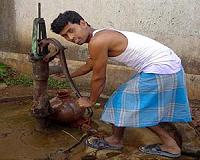 |
Dhaka (AFP) Dec 11, 2010 Dressed in a colourful sari, clutching boxes of herbal tea in one hand and a battered old Nokia mobile phone in the other, Monowara Talukder doesn't look like the average business executive. But in just six years, Talukder has built an international herbal tea empire in Bangladesh that employs 1,500 female farmers, wins orders from major Western health food chains, and has a turnover of 44 million taka (625,000 dollars). She was among the first people to sign up for a mobile phone when they arrived in the country in 1997. The costs were high, but the 48-year-old mother of four says she has never regretted the investment. "My mobile phone has helped so much with the business -- it is absolutely crucial for distribution and marketing," Talukder told AFP over a cup of her signature Tulsi, or Holy Basil, tea in the Bangladeshi capital Dhaka. "I don't have an office or showroom so people just ring me on the mobile to place orders. I now have my products in all 64 districts of Bangladesh and get orders from buyers in Australia, Kuwait and Nepal." She proudly shows off text messages from an Australian company which has just placed a major order for tea bags. "I went to a green trade fair in September and put up posters with my mobile phone number on. Now I am getting all these orders from overseas," she said. But not all women are as lucky as Talukder. The telecoms industry body GSMA says a woman living in South Asia is 37 percent less likely than a man to own a mobile phone -- the world's worst telecoms "gender gap". Traditional attitudes, which mean the first phone in a household will often go to the husband with the second going to the eldest son, were identified as one part of the problem. In a bid to tackle the inequality, Mwomen -- a new project backed by US Secretary of State Hilary Clinton and Cherie Blair, wife of former British prime minister Tony Blair -- was launched in October. Mwomen aims to get mobile phones to some 150 million women globally within three years through public-private partnerships. The project has attracted backing from at least 20 major mobile phone companies, including giants Nokia and Vodafone. "Closing the mobile phone gender gap in South Asia represents a 3.6 billion dollar market opportunity for the mobile industry," Trina DasGupta of the GSMA told AFP. "And a 10-percent increase in mobile phone penetration rates is linked to an increase in GDP of 1.2 percent in low to middle income countries." Another project in Bangladesh is the "village phone" by Grameen Phone, the telecoms wing of Nobel Prize-winning Grameen Bank. Grameen created "village phone ladies" by giving poor rural women loans to buy a mobile phone. Each woman then charges others in her village to use the phone, giving her a small income and putting the community on the telephone network. At least 364,000 women have joined the scheme since it began in 1997, although cheaper handsets and a fall in calling costs may soon make the model outdated. One Mwomen partner, Banglalink, the country's second largest mobile phone company, said Mwomen's approach worked because it combined development objectives with profit-making. "The gender gap is an opportunity for us, commercially. We were the first people to actually target women with specific campaigns," Irum Iqbal, head of communication at Banglalink, told AFP. In 2005, the company launched a calling plan called "Ladies First" followed by a separate advertising campaign featuring a young, female journalist who gets her big break thanks to a tip she receives on her mobile. "It is obviously just good business sense for us and has been our communication strategy since the beginning," Iqbal said. For tea entrepreneur Monowara Talukder, the benefits of a mobile phone are now spreading to the female farmers she employs in her native Gaibandha district in the country's north, one of the poorest parts of Bangladesh. "I'm really proud as about 1,200 of them have been able to buy mobile phones because of growing Tulsi," she said. "They now use their phones to get better harvests. They can call an information hotline on crops, call me to report any problems with harvests. It has really transformed everything for them."
Share This Article With Planet Earth
Related Links Satellite-based Internet technologies
 India aims for Internet revolution to reach rural heartland
India aims for Internet revolution to reach rural heartlandNew Delhi (AFP) Dec 9, 2010 India said Thursday it aims to sharply expand its national broadband network as it seeks a "revolution" to bring high-speed Internet to the country's rural heartland. India is the world's fastest-growing cellular market with some 700 million people having mobile phone services but Internet penetration has trailed badly. At present, the number of broadband connections stands at only 10.3 ... read more |
|
| The content herein, unless otherwise known to be public domain, are Copyright 1995-2010 - SpaceDaily. AFP and UPI Wire Stories are copyright Agence France-Presse and United Press International. ESA Portal Reports are copyright European Space Agency. All NASA sourced material is public domain. Additional copyrights may apply in whole or part to other bona fide parties. Advertising does not imply endorsement,agreement or approval of any opinions, statements or information provided by SpaceDaily on any Web page published or hosted by SpaceDaily. Privacy Statement |